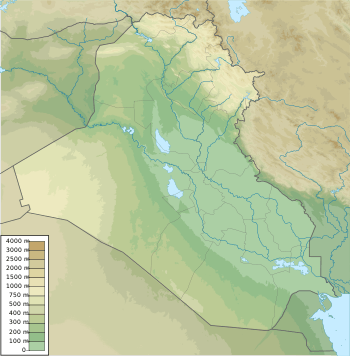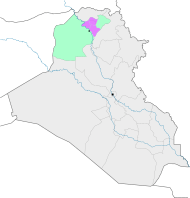Shibaniba
Tell Billa is an archaeological site near Bashiqa in Nineveh Province (Iraq). It is the ancient city of Shibaniba, not far from Assur.
Shibaniba | |
 Shown within Iraq | |
| Location | Nineveh Province, Iraq |
|---|---|
| Region | Northern Mesopotamia |
| Coordinates | 36°26′N 43°19′E |
| Type | tell |
| Site notes | |
| Excavation dates | 1850, 1930–1934 |
| Archaeologists | A.H. Layard, E.A. Speiser, C. Bache |
History of archaeological research
After some minor soundings done by Austen Henry Layard around 1850, Tell Billa was excavated between 1930 and 1934 by a team from the University of Pennsylvania and the American Schools of Oriental Research. The excavation was led by Ephraim Avigdor Speiser with Charles Bache.[1][2][3][4][5][6] The work was complicated by the fact that the mound was divided up among 18 owners including a Jacobite church.[7]
Tell Billa and its environment
The site consists of a large mound and covers around 30 acres (12 ha).
Occupation history
There is some evidence of occupation as far back as the Early Dynastic period, including some Hurrian presence in the middle second millennium. The majority of excavated material, however, is from the Middle Assyrian and Neo-Assyrian times, including glyptic and epigraphic material.
See also
- Cities of the ancient Near East
References
- The Expedition to Tell Billa and Tepe Gawra, Bulletin of the University Museum, University of Pennsylvania, vol. 3(2), pp. 59-66, 1931
- Developments at Tell Billa and Tepe Gawra, Bulletin of the University Museum, University of Pennsylvania, vol. 3(3/4), pp. 94-95, 1932
- Excavations at Tell Billa and Tepe Gawra, Bulletin of the University Museum, University of Pennsylvania, vol. 3(5), pp. 126-130, 1932
- E. A. Speiser, The Bearing of the Excavations at Tell Billa and at Tepe Gawra upon the Ethnic Problems of Ancient Mesopotamia, American Journal of Archaeology, vol. XXXVI, pp. 29-35, 1932
- Charles Bache, Work of the Baghdad School, Bulletin of the American Schools of Oriental Research, no. 51 , pp. 20-26, 1933
- Charles Bache, From Mr. Bache's First Report on the Joint Excavations at Tepe Gawra and Tell Billah, 1932-3, Bulletin of the American Schools of Oriental Research, no. 49, pp. 8-14, 1933
- University of Pennsylvania Museum - Baghdad School Expedition at Billah (letter from E. A. Speiser), Bulletin of the American Schools of Oriental Research, no. 40, pp. 11-14, 1930
Further reading
- C. L. Wooley and E.A. Speiser, Excavations at Ur;the Pottery of Tell Billa, The Museum Journal, vol. 23, no. 3, pp. 249–308, 1933
- Jacob J. Finkelstein, Cuneiform Texts from Tell Billa, Journal of Cuneiform Studies, vol. 7, pp. 111–176, 1953
- Claudio Saporetti, Middle Assyrian Texts of Tell Billa (Graphemic Categorization, No 3), Undena Publications, 1990, ISBN 0-89003-159-2
- Speiser, E. A., Gleanings from the Tell Bilia texts, Symbolae ad iura orientis antiqui pertinentes Paolo Koschaker dedicatae, Leiden, Brill, pp. 141–50, 1939
External links
- Digitizing Tell Billa - work on publishing 1930s digs
- Expedition video from the University of Pennsylvania Museum 4
- Expedition video from the University of Pennsylvania Museum 3
- Expedition video from the University of Pennsylvania Museum 2
- 3rd Millennium BC cylinder seal from Tell Billa - possibly lost
- Archaeological site photographs from the Oriental Institute
- Digital Tell Billa tablets at CDLI
